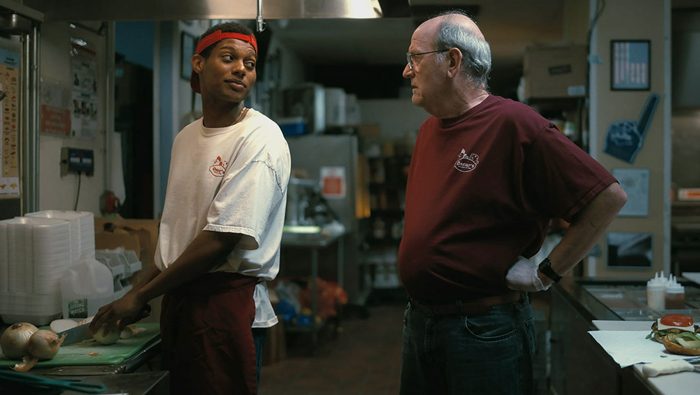
A good performance from Richard Jenkins can’t save The Last Shift, a languid fast food drama that has aspirations of exploring class and race in middle America, but lacks the tools to effectively do so. Documentary filmmaker Andrew Cohn makes the jump to narrative features here, telling the story of a fast food veteran tasked with training a new hire who possesses a wildly different outlook on life. It has the setup of a heartwarming story in which two mismatched men forge a begrudging respect for each other from their shared experiences in the kitchen, but The Last Shift has no interest in being that kind of movie. Instead, it tries to address some of this country’s biggest and most important issues and bites off far more than it can chew.
Jenkins plays Stanley, a high school dropout who nevertheless still wears his class ring. Pride is a defining character trait for him: he’s been working at Oscar’s Chicken and Fish, a fast food joint in his hometown of Albion, Michigan, for the past 38 years, and he takes his job very seriously. He knows the employee handbook, can accurately predict what kind of sauce a customer wants before they order, and is content with the fact that he’s been making $13 an hour for years. But it’s just about time for Stanley to leave town (seemingly for the first time ever), because he needs to move to Florida to pull his aging mother out of her retirement home. Enter Jevon (Shane Paul McGhie), Stanley’s replacement on the night shift. A former writer for his school newspaper, Jevon is a sharp guy who thinks he’s better than this crappy, court-mandated job – but he’s also on probation for defacing a public monument, and he wastes away his potential getting high with his friends to avoid his girlfriend and his baby son.
In the kitchen, Jevon’s disaffected attitude clashes with Stanley’s insistence that everything be just so. Jevon’s speeches about corporate greed seem to jolt Stanley awake (Jenkins plays Stanley as a guy who isn’t the sharpest tool in the shed, so the revelation that a fast food restaurant might not deeply care about its employees seems genuinely shocking to him), and the two briefly form a bond – the type of co-worker relationship where you keep them at arm’s length, but don’t mind being around them.
Stanley sees himself as a good person, but he’s also low-key racist. When Jevon comes to work during his first day, Stanley won’t let him inside. “Did you think I was going to rob the place?” Jevon asks, and Stanley maybe protests a bit too much with his denial. Later, when he finds out Jevon is a writer, he’s curious: “What do you write? Raps and stuff?” When discussion of racial tension bubbles over during one scene, Stanley proves the be the type of white dude who claims black people always “play the race card.” He refuses to acknowledge that white privilege doesn’t mean that white people float through life without problems, but just that they move through the world without having to shoulder the extra burden that people of color carry every day. Acknowledging that there are institutional forces which have been oppressing black people for hundreds of years would require a complete overhaul of Stanley’s simplistic worldview, and it’s too late in the game for that level of rewiring. But the formerly docile Stanley now seems to have unlocked the ability to complain about his station in life, and his sudden entitlement and sense of being wronged is not a good look for him. Jevon isn’t having it, and this part of the movie made me think of what Todd Phillips’ Joker would have been like if it had a character who served as an intellectual counterpoint to Arthur Fleck’s half-baked ideas about aggrieved white men.
But there is the tiniest hint of incremental change. When Stanley was in high school, he and his pal (Ed O’Neill) saw a black kid get attacked (and ultimately killed) by some white bullies, and Jevon asks if Stanley did anything to try to stop the attack – or if he even said anything to the police about it afterward. The answer is no on both accounts, but the repressed memory has been brought to the surface and Stanley can’t quite shake it; for the first time ever, he seriously grapples with whether he should have tried to help. Unfortunately, that microscopic arc for his character is far too small to be satisfying, and by the film’s end, Stanley’s transgressions have piled up so high that it feels almost insulting to conclude this narrative without a deeper excavation of his mind. (One particularly dickish action has serious consequences for Jevon.)
The actors acquit themselves well with the material they’re given, but the film’s reach always far exceeds its grasp. The movie never arrives at a place where all of its conversations and provocations feel like they coalesce into a clear thesis, and its frustrating ending leans toward emotional resonance but doesn’t land with the punch the filmmakers were hoping. This one was just a big miss for me, and while Jenkins is solid as usual, the thing I’ll remember most about this film is that it introduced me to Shane Paul McGhie, a promising young actor who I look forward to seeing in something else.
/Film Rating: 4 out of 10
The post ‘The Last Shift’ Review: This Fast Food Drama Bites Off More Than It Can Chew [Sundance 2020] appeared first on /Film.
from /Film https://ift.tt/3b282Cn
via IFTTT
Comments
Post a Comment